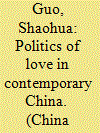| Srl | Item |
| 1 |
ID:
153389


|
|
|
|
|
| Summary/Abstract |
Much has been written about the social composition of China’s rising middle class and their political and economic stances; yet little critical attention has been paid to the visual representation of middle class sensibility in China’s neoliberal era. This article engages in a comparative reading of the actress-turned-director Xu Jinglei’s films My Father and I (2003) and Go Lala Go! (2010), and investigates how Xu’s movies both cultivate and mirror prevalent middle class sentiments by romanticizing and subtly transgressing heterosexual gender relations. It argues that the intertextual reference between Xu’s films, her stardom and social transformation not only projects the cultural aspirations and imaginaries of middle class audiences, but also illuminates the inherent affinity between middlebrow culture, gender dynamics and Chinese urban cinema.
|
|
|
|
|
|
|
|
|
|
|
|
|
|
|
|
| 2 |
ID:
158264


|
|
|
|
|
| Summary/Abstract |
Since the new millennium, the television industry in China has witnessed a flourishing of television series addressing the aspirations, struggles and gender expectations of the urban middle class. Nevertheless, with few exceptions, little scholarly attention has been devoted to the televisual construction of masculine ideals in the contemporary era. Taking as a case study Best Time (最美的时光), one of the most popular idol dramas of 2013, this article fills a lacuna in current scholarship and addresses the televisual construction of cosmopolitan masculinities by focusing on the tension between two prominent social groups: overseas returnees and indigenous talents. Through analysis of the construction of competing masculinities in Best Time, this article argues that this drama is as much about an undertone of national rejuvenation, and the desire for China’s rise and global dominance, as it is about unrequited love. In pursuing this argument, a critical reading of a youth idol drama opens new avenues for understanding cosmopolitanism through the lenses of gender dynamics and nationalism.
|
|
|
|
|
|
|
|
|
|
|
|
|
|
|
|